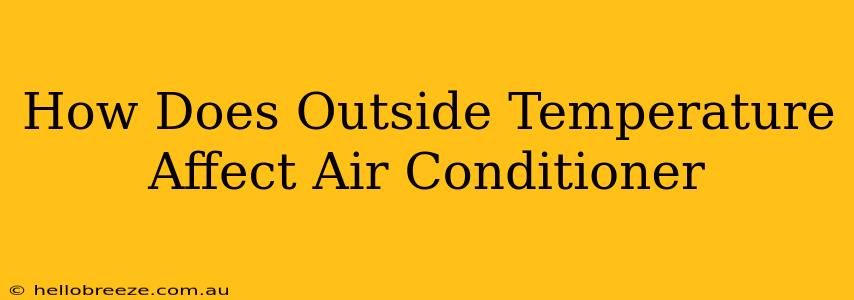Summer's scorching heat often leads to increased reliance on our air conditioners. But have you ever wondered how the outside temperature truly impacts your AC's performance? Understanding this relationship is key to maintaining a cool, comfortable home and maximizing the lifespan of your unit. This article will explore the intricate connection between outdoor temperature and air conditioner efficiency.
The Higher the Temperature, the Harder it Works
This might seem obvious, but it's crucial to understand. Your air conditioner doesn't just magically cool your home; it works by removing heat from the inside and transferring it outside. The greater the temperature difference between inside and outside, the harder your AC unit has to work. Think of it like this: trying to cool a room from 75°F to 70°F on a 90°F day is far easier than cooling it from 85°F to 70°F on the same day. The larger the temperature gap, the more energy your AC consumes.
Extreme Heat and AC Strain
When faced with extremely high temperatures, your air conditioner might struggle to keep up. This strain can lead to several issues:
- Reduced Efficiency: The compressor will run longer and harder, potentially leading to decreased efficiency and higher energy bills.
- Increased Wear and Tear: Constant operation under high stress accelerates wear and tear on the components, shortening the lifespan of your unit.
- Potential for Breakdowns: Overworking the AC can cause it to overheat and break down altogether, requiring costly repairs.
Humidity's Role in the Equation
Temperature isn't the only factor influencing your air conditioner's performance. Humidity plays a significant role. High humidity makes it harder for your AC to remove moisture from the air, impacting its cooling capacity. This is because the air is already saturated with water vapor, making it less effective at absorbing more moisture. The result? Your home might feel less cool and damp even though your AC is running.
Combating Humidity's Impact
Several strategies can mitigate the effect of high humidity on your air conditioner:
- Proper Ventilation: Ensuring adequate ventilation can help reduce indoor humidity.
- Dehumidifier: Using a dehumidifier in conjunction with your AC can significantly improve the comfort level.
- Regular Maintenance: Proper maintenance of your AC unit helps ensure it's operating at peak efficiency, even in humid conditions.
Optimizing Your AC for Extreme Heat
While you can't control the outside temperature, you can take steps to lessen the burden on your air conditioner:
- Regular Maintenance: Schedule annual professional maintenance to ensure your unit is clean, well-lubricated, and operating optimally. This includes cleaning the coils and checking the refrigerant levels.
- Shade Your Unit: Try to keep direct sunlight off your outdoor AC unit. Shade helps to prevent it from overheating.
- Upgrade to a High-Efficiency Model: Consider upgrading to a more energy-efficient AC unit if yours is outdated. Look for units with high SEER ratings (Seasonal Energy Efficiency Ratio).
- Smart Thermostat: A programmable or smart thermostat allows for better temperature control and can significantly reduce energy consumption.
Conclusion: Understanding the Outside Temperature's Effect
Understanding how the outside temperature affects your air conditioner is vital for maximizing its efficiency and longevity. By taking preventative steps and maintaining your unit properly, you can ensure a comfortable and cool home, even during the hottest summer days. Remember, regular maintenance and strategic use of your system are key to beating the heat and saving money on your energy bills.

